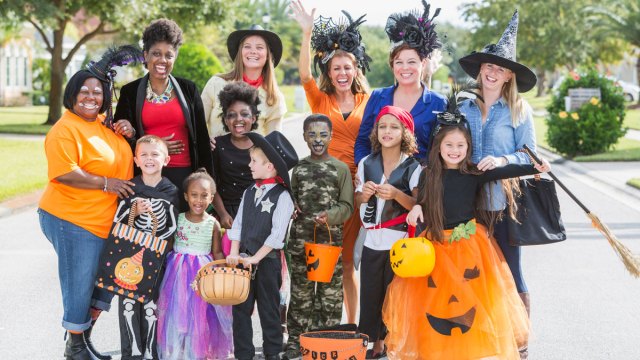This Halloween, I’m looking forward to chatting with the neighbors I haven’t spoken to since quarantine. It was horror that brought us together then, too.
During those early days of lockdown, I got to know the other mothers outside. We cracked open White Claws, pulled up lawn chairs, and sat on our respective lawns to have conversations across the fence as our children played beside us. We talked about the impossibilities of pandemic parenting. We swapped stories of our anxieties, our meltdowns, our fears of inadequacy.
I found myself so grateful to have such incredible human beings living right beside me. I chided myself for not having gotten to know them more before. I made a quiet promise that once we flattened the curve, once the world returned to normal, we would continue developing these relationships forged during such terror.
But, of course, we didn’t—we moved on with our lives: to our different schools and churches and sports teams. We share a backyard, a street, but we never really see each other.
I know, though, that I’ll see them this Halloween for Trick or Treat: We’ll clear our regular schedules for two hours of street walking, door knocking, and candy eating. For an evening, I’ll find myself feeling as close to my neighbors as I do my own family.
Halloween is a holiday I could never fully embrace until adulthood. In childhood, my parents begrudgingly allowed me to Trick or Treat. My mother insisted that I keep my costumes pretty, rather than scary—as if those things aren’t two sides of the same coin. For most in my community, Halloween was a day to cloister away. At my fundamentalist, Christian school, for instance, the holiday may as well not have existed. We were not offered soft alternatives to the secular celebration, vague costumed events, the distribution of candy for evangelistic purposes.
It was not fear we wanted to avoid. There was plenty of that. During countless nights as a child, I laid awake listening to the creak of the wooden floorboards in our rural home. I was sure that the moans of our house were demons rushing past my bedside. I feared my neighbors would spend eternity in hell. I obsessed over my own potential damnation, too.
I was well versed in fear—but it was identifying with others, truly empathizing with their horrors, that seemed dangerous. My community’s experience of Halloween was lacking. Most significantly, what we missed out on was neighborliness.
The day after Trick or Treat, my friends at school swapped stories of hiding away from their neighbors. They turned off all the lights upstairs to hunker in their basements eating pizza and playing board games as they listened to their peers roaming the streets above them.
For a holiday like Christmas, there is a tendency to moralize the celebration, to reflect upon the greater significance of it all. Christmas is not just about presents; it’s about family and love. While this type of interpretation is not usually applied to Halloween, I argue that it could be. Halloween is not just about candy and ghosts; it’s about community.
Unlike holidays later in the season, Halloween is not stratified by religion or geography. Its main celebratory event, Trick or Treat, hinges on individuals with few commonalities intermingling outside, rather than nuclear families hunkering away for private, closed traditions. And this is one of the reasons that Halloween, a holiday I barely celebrated as a child, has become one of my favorites in adulthood.
Part of what’s so wonderful about the holiday, too, is how low maintenance it is. Participation does not require an entire budget overhaul. The women in the family do not have to get up at the crack of dawn on the day of celebration to cook. The festivities happen outdoors—there’s no need to clean house.
Through the ritual of costuming ourselves, we all come together. If you don’t have family, you can still celebrate by handing out Dollar Store candy on the side of your curb. Which is precisely what I’ll be doing this year: candy in one hand and maybe a White Claw in the other. I’ll be waiting for the other mothers I like so much, eager to reconnect. Maybe this year, our conversations will lead us to commune in a context that is not solely about shared fear.
